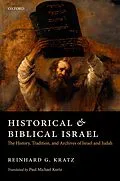At the center of this book lies a fundamental yet unanswered question: under which historical and sociological conditions and in what manner the Hebrew Bible became an authoritative tradition, that is, holy scripture and the canon of Judaism as well as Christianity. Reinhard G. Kratz answers this very question by distinguishing between historical and biblical Israel. This foundational and, for the arrangement of the book, crucial distinction affirms that the Israel of biblical tradition, i.e. the sacred history (historia sacra) of the Hebrew Bible, cannot simply be equated with the history of Israel and Judah. Thus, Kratz provides a synthesis of both the Israelite and Judahite history and the genesis and development of biblical tradition in two separate chapters, though each area depends directly and inevitably upon the other. These two distinct perspectives on Israel are then confronted and correlated in a third chapter, which constitutes an area intimately connected with the former but generally overlooked apart from specialized inquiries: those places and "archives" that either yielded Jewish documents and manuscripts (Elephantine, Al-Yahudu, Qumran) or are associated conspicuously with the tradition of the Hebrew Bible (Mount Gerizim, Jerusalem, Alexandria). Here, the various epigraphic and literary evidence for the history of Israel and Judah comes to the fore. Such evidence sometimes represents Israel's history; at other times it reflects its traditions; at still others it reflects both simultaneously. The different sources point to different types of Judean or Jewish identity in Persian and Hellenistic times.
Autorentext
Reinhard G. Kratz is Professor of Hebrew Bible/ Old Testament at the University of Göttingen.; Paul Michael Kurtz is Research Associate at the Institute of Hebrew Bible, University of Göttingen.
Inhalt
- Introduction
- Part A. The History of Israel and Judah
- I. The Premises
- 1. The Beginning and End
- 2. The Sources
- 3. The Setting
- 4. The Origins of Israel
- II. The Two Kingdoms
- 1. Transition to the Monarchy
- 2. Saul, David, and Solomon
- 3. The Kingdom of Israel
- 4. The Kingdom of Judah
- III. The Two Provinces
- 1. Samaria, Judah, and the Diaspora
- 2. The Hasmonean Kingdom
- 3. The Herodian Kingdom
- IV. An Outline of Religious History
- 1. The Religion of Israel and Judah
- 2. The Biblical Tradition
- 3. The Jewish Religion
- Part B. The Biblical Tradition
- I. The Premises
- 1. Scribal Culture and Biblical Tradition
- 2. Scribes and Scribal Schools
- 3. Writing and Writing Media
- 4. Pre-Biblical Written Sources
- II. Transformation into Biblical Tradition
- 1. From Weal to Woe: The Prophetic Tradition
- 2. From People of State to People of God: The Narrative Tradition
- 3. From Justice to Law: The Legislative Tradition
- 4. From Divine Kingship to Kingdom of God: The Psalmic Tradition
- 5. From Sages to Pious: The Sapiential Tradition
- III. The Books of the Hebrew Bible
- 1. The Law (Torah)
- 2. The Prophets (Nevi'im)
- 3. The Writings (Ketuvim)
- 4. Apocrypha and Pseudepigrapha
- IV. A Sketch of Literary History
- 1. Historical and Biblical Israel
- 2. The Era of the Two Kingdoms
- 3. The End of Israel
- 4. The End of Judah
- 5. The Era of the Two Provinces
- 6. A View of the Para-Biblical Tradition
- Part C. Jewish Archives
- I. The Locations of Literature
- II. Between Elephantine and Qumran
- 1. Elephantine
- Excursus: Al-Yahudu in Babylonia
- 2. Qumran
- 3. Gerizim
- 4. Jerusalem
- 5. Alexandria
- III. Israel and Judaism
- 1. Non-Biblical and Biblical Judaism
- 2. History and Tradition
- List of Kings and High Priests
- Glossary
- Bibliography
- Index
